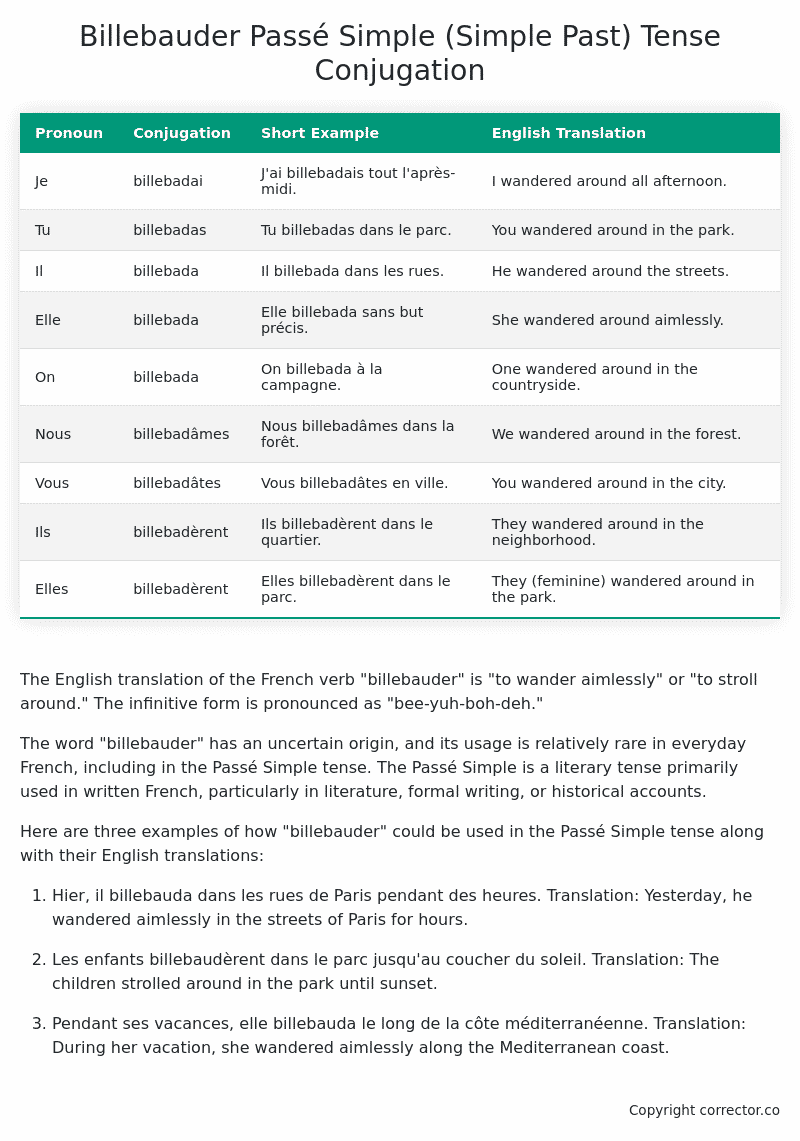Passé Simple (Simple Past) Tense Conjugation of the French Verb billebauder
Introduction to the verb billebauder
The English translation of the French verb “billebauder” is “to wander aimlessly” or “to stroll around.” The infinitive form is pronounced as “bee-yuh-boh-deh.”
The word “billebauder” has an uncertain origin, and its usage is relatively rare in everyday French, including in the Passé Simple tense. The Passé Simple is a literary tense primarily used in written French, particularly in literature, formal writing, or historical accounts.
Here are three examples of how “billebauder” could be used in the Passé Simple tense along with their English translations:
-
Hier, il billebauda dans les rues de Paris pendant des heures.
Translation: Yesterday, he wandered aimlessly in the streets of Paris for hours. -
Les enfants billebaudèrent dans le parc jusqu’au coucher du soleil.
Translation: The children strolled around in the park until sunset. -
Pendant ses vacances, elle billebauda le long de la côte méditerranéenne.
Translation: During her vacation, she wandered aimlessly along the Mediterranean coast.
Table of the Passé Simple (Simple Past) Tense Conjugation of billebauder
| Pronoun | Conjugation | Short Example | English Translation |
|---|---|---|---|
| Je | billebadai | J’ai billebadais tout l’après-midi. | I wandered around all afternoon. |
| Tu | billebadas | Tu billebadas dans le parc. | You wandered around in the park. |
| Il | billebada | Il billebada dans les rues. | He wandered around the streets. |
| Elle | billebada | Elle billebada sans but précis. | She wandered around aimlessly. |
| On | billebada | On billebada à la campagne. | One wandered around in the countryside. |
| Nous | billebadâmes | Nous billebadâmes dans la forêt. | We wandered around in the forest. |
| Vous | billebadâtes | Vous billebadâtes en ville. | You wandered around in the city. |
| Ils | billebadèrent | Ils billebadèrent dans le quartier. | They wandered around in the neighborhood. |
| Elles | billebadèrent | Elles billebadèrent dans le parc. | They (feminine) wandered around in the park. |
Other Conjugations for Billebauder.
Le Present (Present Tense) Conjugation of the French Verb billebauder
Imparfait (Imperfect) Tense Conjugation of the French Verb billebauder
Passé Simple (Simple Past) Tense Conjugation of the French Verb billebauder (You’re reading it right now!)
Passé Composé (Present Perfect) Tense Conjugation of the French Verb billebauder
Futur Simple (Simple Future) Tense Conjugation of the French Verb billebauder
Futur Proche (Near Future) Tense Conjugation of the French Verb billebauder
Plus-que-parfait (Pluperfect) Tense Conjugation of the French Verb billebauder
Passé Antérieur (Past Anterior) Tense Conjugation of the French Verb billebauder
Futur Antérieur (Future Anterior) Tense Conjugation of the French Verb billebauder
Subjonctif Présent (Subjunctive Present) Tense Conjugation of the French Verb billebauder
Subjonctif Passé (Subjunctive Past) Tense Conjugation of the French Verb billebauder
Subjonctif Imparfait (Subjunctive Imperfect) Tense Conjugation of the French Verb billebauder
Conditionnel Présent (Conditional Present) Tense Conjugation of the French Verb billebauder
Conditionnel Passé (Conditional Past) Tense Conjugation of the French Verb billebauder
Conditionnel Passé II (Conditional Past II) Tense Conjugation of the French Verb billebauder
L’impératif Présent (Imperative Present) Tense Conjugation of the French Verb billebauder
L’impératif Passé (Imperative Past) Tense Conjugation of the French Verb billebauder
L’infinitif Présent (Infinitive Present) Tense Conjugation of the French Verb billebauder
L’infinitif Passé (Infinitive Past) Tense Conjugation of the French Verb billebauder
Le Participe Présent (Present Participle) Tense Conjugation of the French Verb billebauder
Le Participe Passé (Past Participle) Tense Conjugation of the French Verb billebauder
Struggling with French verbs or the language in general? Why not use our free French Grammar Checker – no registration required!
Get a FREE Download Study Sheet of this Conjugation 🔥
Simply right click the image below, click “save image” and get your free reference for the billebauder Passé Simple tense conjugation!

Billebauder – About the French Passé Simple (Simple Past) Tense
Formation
Usage
Narration
Historical Context
Interactions with other tenses
Passé Composé
Imparfait
Conditional and Subjunctive
Summary
I hope you enjoyed this article on the verb billebauder. Still in a learning mood? Check out another TOTALLY random French verb conjugation!


